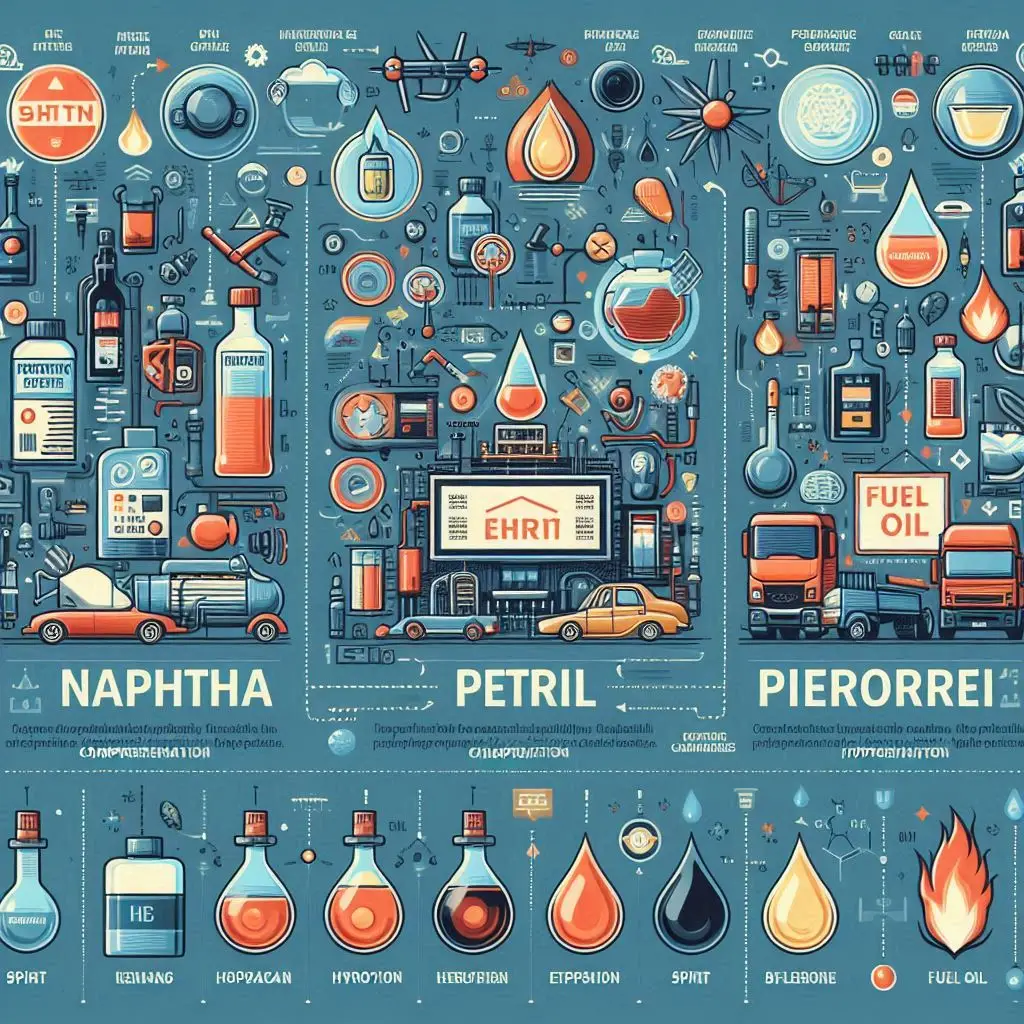
Naphtha vs Petrol vs Petroleum Ether vs Spirit vs Fuel Oil
Introduction
This article, Naphtha vs Petrol vs Petroleum Ether vs Spirit vs Fuel Oil, will delve into the comparisons between these hydrocarbons, exploring their characteristics, uses, and key differences.
Understanding the differences between naphtha, petrol, petroleum ether, spirit, and fuel oil is essential for industries and consumers alike. Each of these hydrocarbons serves distinct purposes, has unique properties, and is utilized in various applications. Naphtha, for instance, is a versatile intermediate in petrochemical production, while petrol (or gasoline) is a primary fuel for vehicles. Petroleum ether is often used in laboratories and as a solvent, whereas spirit (typically denoting ethanol) has applications in both industrial and recreational sectors. Fuel oil is primarily used for heating and energy generation.
Naphtha vs Petrol
When discussing naphtha vs petrol, it's important to recognize their respective compositions and applications. Naphtha is a volatile liquid hydrocarbon mixture derived from crude oil and used primarily as a feedstock in the petrochemical industry. It is produced through the distillation of crude oil and can be further refined into various products, including gasoline, solvents, and chemicals. Its boiling range typically falls between 30°C and 200°C.
In contrast, petrol, commonly known as gasoline, is specifically formulated for use as fuel in internal combustion engines. Petrol is a highly refined product obtained from the distillation of crude oil, and its formulation includes additives to improve performance, reduce emissions, and enhance stability. The boiling point of petrol is generally between 30°C and 200°C as well, but it is engineered to provide optimal combustion properties in engines.
One major difference lies in their usage; while naphtha serves primarily as a precursor for chemical production, petrol is a direct fuel source for automobiles. Additionally, naphtha has a higher flash point than petrol, which means it is less volatile and poses lower risks during storage and handling. Understanding these distinctions is crucial for industries that require specific hydrocarbons for their operations.
Naphtha vs Petroleum Ether
In the comparison of naphtha vs petroleum ether, we find two hydrocarbons with different characteristics and applications. Naphtha is a broad term that encompasses a variety of light hydrocarbons, while petroleum ether refers specifically to a group of highly volatile, low-boiling-point aliphatic hydrocarbons derived from petroleum. The production process for petroleum ether involves the distillation of petroleum fractions to obtain lighter components, typically with boiling points below 60°C.
One of the primary uses of petroleum ether is as a solvent in laboratories and industrial applications, making it an essential compound in chemical research and synthesis. In contrast, naphtha, due to its versatility, is used as a solvent as well but plays a more significant role in producing petrochemicals, such as ethylene and propylene, which are foundational for various plastic products and chemicals.
Moreover, while both substances are flammable, petroleum ether is more volatile than naphtha, meaning it evaporates quickly at room temperature. This property makes petroleum ether an excellent choice for applications requiring rapid solvent action, but it also necessitates careful handling to avoid inhalation or skin contact. Understanding these differences is vital for choosing the appropriate hydrocarbon for specific applications.
Naphtha and Petroleum Spirit
When exploring naphtha and petroleum spirit, it's essential to define both terms clearly. Naphtha, as previously discussed, refers to a broad category of light hydrocarbons used in various industrial applications. Petroleum spirit, often synonymous with naphtha, specifically denotes a refined product obtained from the distillation of crude oil that contains lighter aliphatic and aromatic hydrocarbons. This term is commonly used in the UK, while in other regions, naphtha may refer to different formulations.
Petroleum spirit is primarily used as a solvent in paint thinners, varnishes, and other chemical products. It can also be used as a cleaning agent in various industries. Naphtha's versatility allows it to be employed not only as a solvent but also as a feedstock for petrochemical production.
The distinction lies in the refining process and the intended use. Petroleum spirit is often more refined and has a more consistent composition compared to naphtha, which can vary depending on its source and processing. Both hydrocarbons are flammable, and safety precautions should be taken when handling them. The choice between naphtha and petroleum spirit ultimately depends on the specific requirements of the application.
Naphtha vs Fuel Oil
The comparison of naphtha vs fuel oil highlights significant differences in composition, properties, and applications. Naphtha is a light hydrocarbon mixture that serves as a key feedstock in the petrochemical industry, while fuel oil is a heavier hydrocarbon product used primarily for heating and power generation.
Fuel oil is produced through the distillation of crude oil, similar to naphtha, but it contains higher molecular weight compounds, resulting in a thicker and more viscous liquid. This viscosity allows fuel oil to burn more slowly and steadily, making it suitable for applications in boilers, furnaces, and diesel engines. In contrast, naphtha is more volatile and burns more quickly, making it suitable for uses such as gasoline production and solvent applications.
Moreover, fuel oil has a higher energy content per unit volume than naphtha, which can influence the choice of fuel for different applications. The environmental impact of these fuels is also a consideration, with fuel oil often having higher emissions of sulfur and particulate matter compared to naphtha. Understanding these distinctions is essential for industries involved in energy production and chemical manufacturing.
Conclusion
In conclusion, the differences among naphtha, petrol, petroleum ether, spirit, and fuel oil are critical for understanding their diverse applications in industry and everyday life. Naphtha serves as a crucial intermediate in the petrochemical industry, while petrol functions primarily as a fuel for vehicles. Petroleum ether is a versatile solvent, and spirit refers to alcohol used in various industrial applications. Fuel oil, on the other hand, is primarily employed for heating and energy generation. By recognizing the unique properties and uses of each hydrocarbon, individuals and industries can make informed choices regarding their applications and handling requirements.

